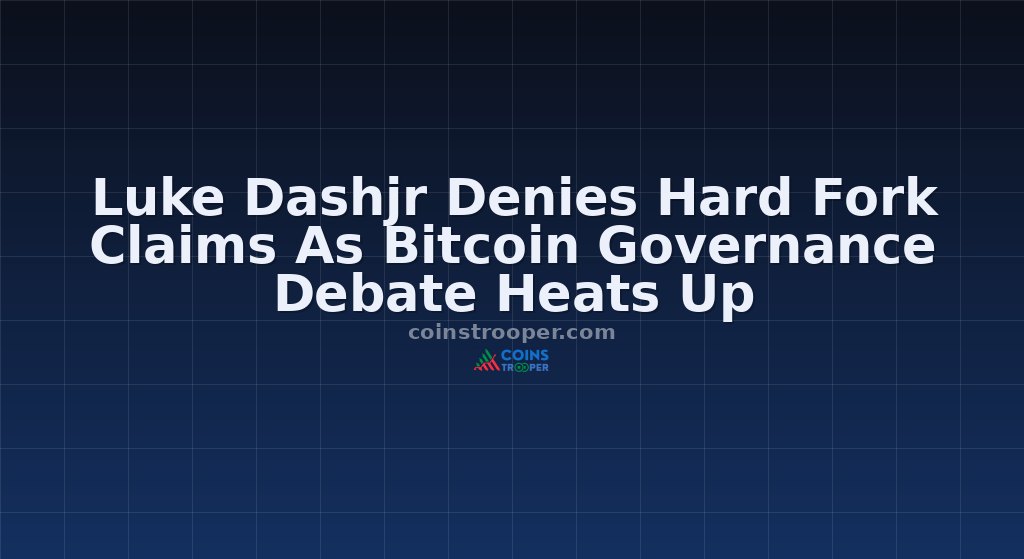Luke Dashjr Denies Hard Fork Claims As Bitcoin Governance Debate Heats Up

- Debates over Bitcoin’s future are nothing new, but this week the discussion took on a sharper edge.
- One of Bitcoin’s long-serving developers was at the center of a storm about immutability, censorship and what it means to “save” the protocol.
- The piece cited purported leaked text messages in which Dashjr allegedly warned: “Either Bitcoin dies or we have to trust someone.”
- The Rage responded with a meme to the effect of demanding to know who sent the leaked messages that its story shared.
What Happened
The controversy escalated on Sept. 25, following an article published by The Rage claiming to reveal that Luke Dashjr, maintainer of the Bitcoin Knots software, advocates a hard fork that would install a trusted multisig committee with power to retroactively alter the blockchain, review transactions and remove illicit content.
A blockchain hard fork is a permanent divergence from the previous version of the blockchain software, requiring all participants to upgrade to the new protocol because the new and old versions are incompatible.
Dashjr repeated his position multiple times over the following 24 hours. “Nope, nothing changed. Nobody is calling for a hard fork still." he posted. In another reply, he underlined: “There is no hard fork.”
The alleged hard fork proposal cut to the heart of that tension. For Dashjr’s critics, it seemed to confirm fears that his vision requires compromising Bitcoin’s principle of immutability. For his defenders, the leak was an opportunistic smear designed to derail the case for stronger spam filters.
“Not a Luke fan but this is a hit piece and fake news. He is not proposing this,” Wertheimer posted on X, referring to the supposed hard fork plan.
Market Context
While there’s no direct evidence linking this dip to the controversy over Dashjr’s alleged plans, the timing is hardly helpful. In crypto markets, uncertainty alone can amplify downward pressure and rumors of protocol upheaval tend to stoke exactly that.
Why It Matters
Knots enforces tighter transaction policies, including blocking non-financial data such as Ordinals inscriptions and Runes tokens. Dashjr and his supporters argue such measures protect Bitcoin’s monetary integrity and safeguard it from regulatory risks. Core developers have historically taken a more permissive approach, tolerating non-standard data as long as it does not break consensus.
Details
Debates over Bitcoin’s future are nothing new, but this week the discussion took on a sharper edge. One of Bitcoin’s long-serving developers was at the center of a storm about immutability, censorship and what it means to “save” the protocol.
The piece cited purported leaked text messages in which Dashjr allegedly warned: “Either Bitcoin dies or we have to trust someone.”
The story spread across X, drawing hundreds of thousands of views and intensifying a long-running philosophical rift: should Bitcoin remain a neutral settlement layer, or should developers actively filter what counts as legitimate use of the network?
Dashjr rejected the claims outright. “The truth is I have not proposed a hardfork or anything of the sort, and these bad actors are just grasping at straws to slander me and try to undermine my efforts to save Bitcoin again,” he wrote.
The Rage responded with a meme to the effect of demanding to know who sent the leaked messages that its story shared.
The Knots vs. Core Divide
Behind the dispute lies a deeper divide between Dashjr’s Bitcoin Knots project and the broader Bitcoin Core software used by most of the network.
Among his defenders was Udi Wertheimer, co-founder of Taproot Wizards, a Bitcoin Ordinals project, so one which most would assume embodies everyting to which Dashjr is opposed.
"I'm (obviously) not on Luke's side but...this is just a sloppy low quality propaganda piece," he wrote.
Wertheimer concluded that what Dasjhr's leaked messages were a hypothetical discussion about using zero-knowledge proofs to allowing Knots nodes to avoid downloading "spam."
"This is, as always, a nothing burger," he concluded. "It's pretty obvious to me that this proposal never gets implemented, and even if it did, it does not censor the network and does not split the network, and remains fully compatible with core."
It’s worth noting that over the past 24 hours, bitcoin (BTC) slipped 2.2% to trade at around $109,000, a drop of over 5.5% in the last week.

